How to Choose Between a 12V and 24V Solar Panel?
It is awesome that you have decided to go solar. Your decision will not only result in savings for you but is also a good option for the environment. But there are many different parameters to screen before deciding upon your final solar panel and being a common man, it becomes difficult to decide. It becomes difficult to choose between the tons of choices available in the market today.
You first screen through hundreds of brands available in the market and then come to a final decision, based on the manufacturer’s credibility, warranty, services, etc. Then you need to decide the rating of your panel. A solar panel is available in a wide range of wattages and volts. We also receive many queries from our readers and potential buyers who are confused about the rating of the solar panel they wish to buy.
This blog is for those audiences. It tries to differentiate between a 12V solar panel and a 24V solar panel. A 12V solar panel is generally suitable for small residences or projects of smaller size in contrast to a 24V solar panel. Other than this basic thumb rule, there are different technicalities to consider when deciding between the two. We have tried to differentiate between them basis five points:
- Compatibility with Battery
- Compatibility with Inverter
- Compatibility with Charge Controller
- Real Use Case (Applications)
- Range & Pricing
1. Compatibility with Battery
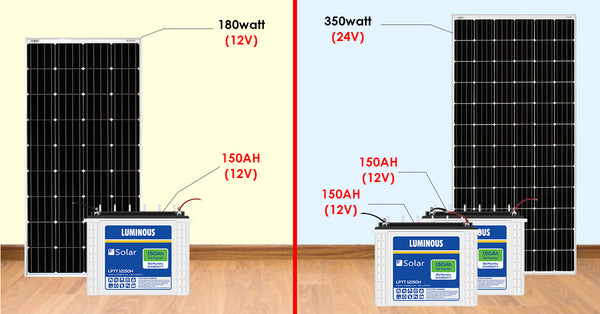
The choice of the rating of a solar panel depends on the rating of the battery used. Generally, a 12V solar panel should be paired with a 12V battery and a 24V solar panel should be used with a 24V Battery. An important point to be noted here is that a 24V rating battery is not available in the market, but you can create one by joining two 12V batteries in a series connection.
- 24V panel - 24V (2* 12V batteries in series connection)
- 12V panel - 12V battery
- 6V Panel – 2/6V battery
2. Compatibility with Inverter
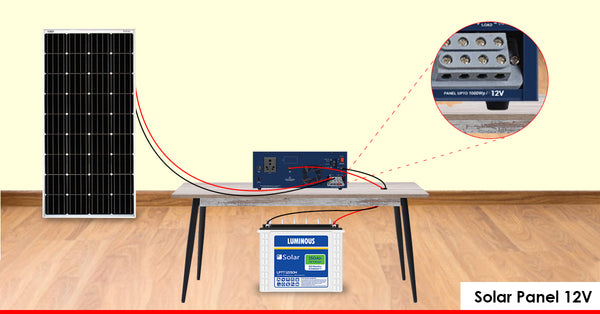
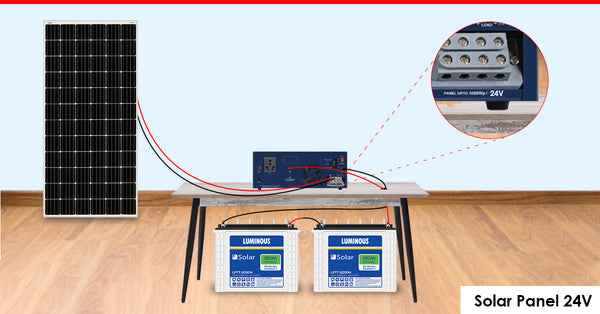
Like the battery, solar panel should also be compatible with the rating of the inverter. For example, a 12V solar panel should be paired with a 12V inverter and a 24V solar panel should be used with a 24V inverter. Inverters are available in different ratings like 12V, 24V, 48V, etc.
- 12V battery - 12 V inverter - 12 V solar panel will be connected
- 24V battery (connected in series) - 24V inverter - 24V solar panel will be connected
3. Compatibility with Charge Controller
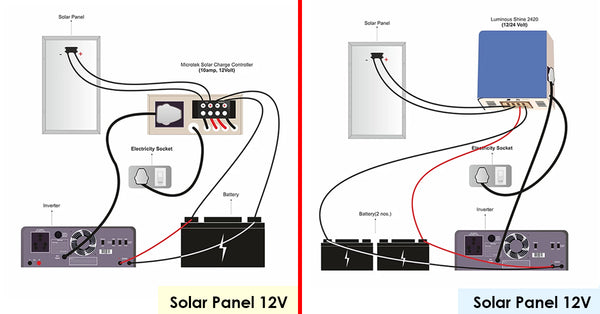
The rating of a charge controller should match with the ratings of the inverter and the battery. If a 12V battery and a 12V inverter is there, a 12V Charge controller should be used. Similarly, for 24V. One important thing to keep in mind here is that the solar panel’s rating should not be higher than that of the charge controllers. For instance, a 9 Ampere solar panel cannot be paired with a 6 Ampere charge controller.
A Charge controller is available in a wide range of ratings from 6 Ampere to 53 Ampere. Solar panels are also available in different ratings e.g.
- 10W Panel - 1 Amp
- 20W Panel - 2.5 Amp
- 180W Panel - 9 Amp
- 350W Panel - 8-9 Amp
4. Application
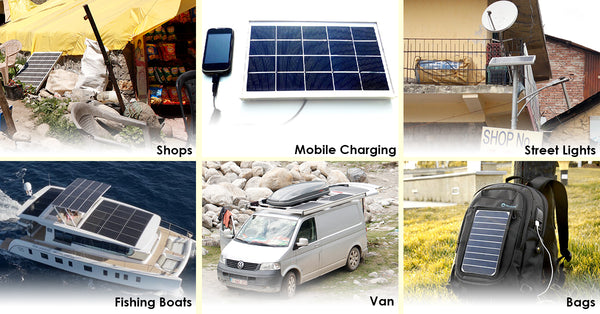
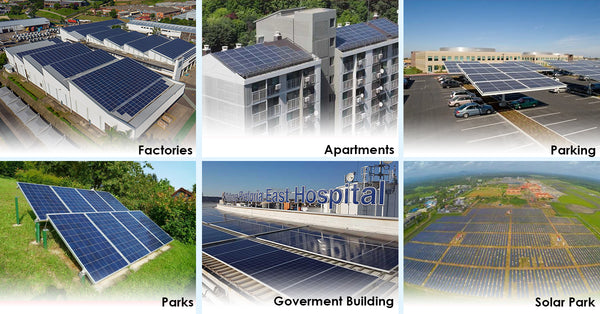
A 12V solar panel can be used for different applications like street lights, tourist van, shops, small homes, home lighting, mobile charging, solar bag, science project, solar water pump, office, fishing boats, etc.
A 24V solar panel can be used in big homes, hospitals, banks, offices, on grid applications like factories, apartments, parking, parks, government building, solar parks, etc. To see our case studies.
5. Range & Pricing
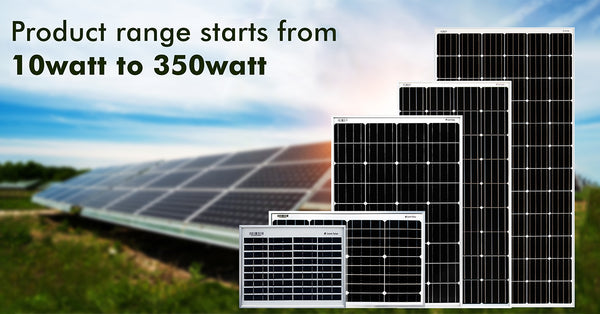
12V solar panel is available in 10W, 20W, 40W, 50W, 125W, 160W and 180W, whereas 24V is available in 330W and 350W.
Price of a 12V solar panel can vary in between Rs. 2,400 and Rs. 15,000. Price of a 24V solar panel can vary in between Rs. 11,000 and Rs. 24,000.
Solar Panel Buying Guide
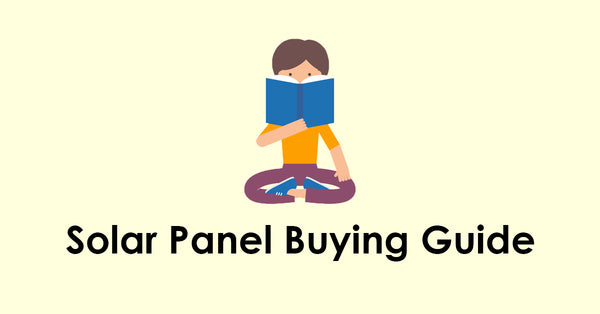
Customers are often confused as to how much load can be supported by solar panels. One important point to highlight here is that the function of a solar panel is to charge the battery and not to make appliances work. Let’s talk more about this in detail.
Home load depends on inverter load capacity and back up power and time depends on the battery’s range. A panel’s range should be double that of the battery.
Must read this example, a small home needs a minimum of 300 W to run a fridge, fan, and light which can be easily supported by a 1 kVa inverter. Let’s calculate and see what is the load of the house in use in case of a Power failure. Now, the time for which appliances will work on back up depends on the battery’s capacity. Typically a 150Ah battery with 12V rating can store upto 1800 W of power.
Simple Calculation is 150 AH battery * 12V = 1800 W
Taking a lead acid battery with 70% efficiency only 1400 W load should be available and will work for 4-5 hours. Considering a small home needs a minimum of 300 W.
Thumb Rule:
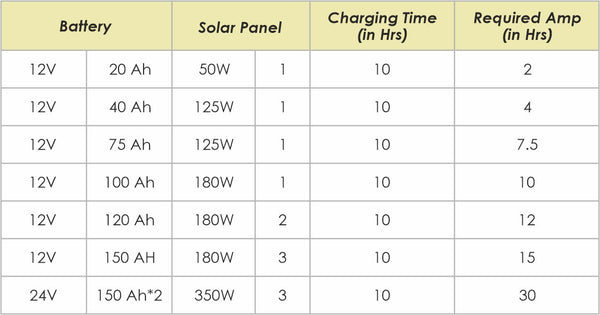
**Now let’s calculate in how much time will a battery be charged and how many solar panels are required to be installed, which are other common questions in the minds of the buyers.
This depends on the sunlight’s availability. On an average, sunlight is there for 10 hours. So a battery will take:
150/15 = 10 hrs
Assuming 150 Ah battery and 15 Amp of power, i.e. if the battery receives 15 Amp it will take 10 hours to charge.
A Solar panel is typically 9 Amp, so typically 2-3 solar panels will be required.
Watch Video
Know how to charge battery from solar panel and how to know battery backup time
Summary
This blog is dedicated for readers to decide as to how many solar panels they should buy to support the normal functioning of their house, in case of a power cut, what voltage of solar panel - 12V or 24V is suitable for you, and for how many hours my fan and lights will work on solar in case of a load shedding. A lot of this depends upon the ratings of the battery, inverter and charge controller. We hope we were able to help you to some extent. You can keep writing to us for more such queries in comment section.

Such a device is beneficial because it reduces the stress that comes about when a machine stops running because something became lose or worn out. There is also reduced maintenance cost since it is less prone to wear. This generally makes the device very easy to handle for a person with very little skills in handling a solar panel. www.zonnepanelen-soloya.nl
ReplyDeleteSolar power is a "green" and renewable power and doesn't emit harmful carbon dioxide, which means it's a great way to reduce your carbon footprint. Close to 3000 pounds of CO2 per year can be saved by a typical home solar energy system, which works out to about 30 tons over its lifetime. These clean, green technologies will be the core of the next industrial revolution, according to Tony Juniper, Friends of the Earth director. Zonnepanelen Limburg
ReplyDeleteHey, I was read your blog it very helps full and filled with lots of information. I was read your blog and with this blog, I got to know how much important is SEO writing. I was also read another blog it will also helpful for Freelance Content Creator in Delhi.
ReplyDeleteFreelance Content Creator in Delhi